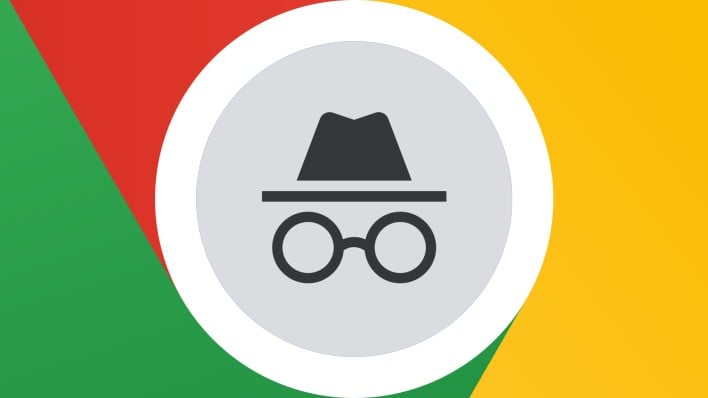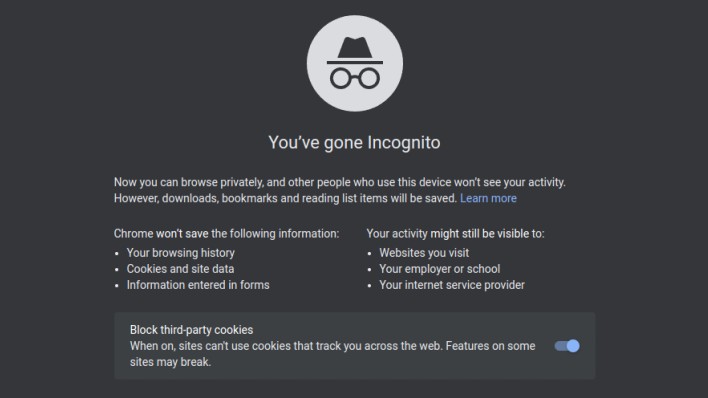Privacy Lawsuit Exposes Google Employees Cracking Jokes About Chrome's Incognito Mode

This week, the Northern District of California court is considering whether to let a lawsuit filed against Google continue as a class action lawsuit. The suit in question is seeking statutory damages on behalf of millions of Google Chrome users, claiming that Google misled users of Chrome’s Incognito mode into a false sense of privacy all while collecting their data. The court documents submitted as part of this case include emails and messages sent by Google employees discussing the possibly misleading nature of Incognito mode and even cracking jokes at its expense.
For most of its lifetime, Chrome’s Incognito mode simply opened a fresh browser window with no cookies or history, then deleted any cookies or history accumulated during use once the window was closed. More recently, Google added the further capability of blocking third-party cookies, which could be utilized to track users across different websites. However, even with this additional feature, Incognito mode is far from a truly private or anonymous browsing mode. Nonetheless, users can be forgiven for thinking that Incognito mode is exactly that.
One Google Chrome engineer, speaking with some fellow Chrome engineers in 2018, wrote, “We need to stop calling it Incognito and stop using a Spy Guy icon.” Another engineer responded to this message by linking to a wiki page for a character from the TV show The Simpsons named “Guy Incognito.” This character is played off as a gag, appearing as a poorly disguised Homer Simpson, the show’s main character. Guy looks almost exactly the same as Homer Simpson, excepting a small mustache, a suit, and hat. After linking to this character’s wiki page, the engineer joked, “Regardless of the name, the Incognito icon should always have been Guy Incognito. Which also accurately conveys the level of privacy it provides.”
For most of its lifetime, Chrome’s Incognito mode simply opened a fresh browser window with no cookies or history, then deleted any cookies or history accumulated during use once the window was closed. More recently, Google added the further capability of blocking third-party cookies, which could be utilized to track users across different websites. However, even with this additional feature, Incognito mode is far from a truly private or anonymous browsing mode. Nonetheless, users can be forgiven for thinking that Incognito mode is exactly that.
One Google Chrome engineer, speaking with some fellow Chrome engineers in 2018, wrote, “We need to stop calling it Incognito and stop using a Spy Guy icon.” Another engineer responded to this message by linking to a wiki page for a character from the TV show The Simpsons named “Guy Incognito.” This character is played off as a gag, appearing as a poorly disguised Homer Simpson, the show’s main character. Guy looks almost exactly the same as Homer Simpson, excepting a small mustache, a suit, and hat. After linking to this character’s wiki page, the engineer joked, “Regardless of the name, the Incognito icon should always have been Guy Incognito. Which also accurately conveys the level of privacy it provides.”

Last year, Lorraine Twohill, Google’s marketing chief, sent an email to the inbox of Sundar Pichai, who is the Chief Executive of Alphabet, Google’s parent company. The email presented some ideas intended to help the company gain user trust, including making Incognito mode “truly private.” Twohill explained, “We are limited in how strongly we can market Incognito because it’s not truly private, thus requiring really fuzzy, hedging language that is almost more damaging.” An internal presentation given one year prior contained a slide expressing a similar sentiment: “Unless it is clearly disclosed that their activity may be trackable, receiving targeted ads or suggestions based on private mode may erode trust.”
While the disclaimer that appears when you first enter Incognito mode explains that websites, employers, and internet service providers (ISPs) may still be able to track users’ browsing activity, the disclaimer doesn’t say anything about what information Google may collect on Incognito mode users. The lawsuit against Google highlights a somewhat bold internal proposal submitted by a Google Chrome product lead suggesting that the company change the Incognito mode disclaimer to read “You are NOT protected from Google.” Unsurprisingly, this proposal was rejected by Google’s executives.
Given a chance to respond to the claims put forward in the lawsuit, a spokesman for Google, José Castañeda, told Reuters the following: “Incognito mode offers users a private browsing experience, and we’ve been clear about how it works and what it does, whereas the plaintiffs in this case have purposely mischaracterized our statements. Privacy controls have long been built into our services and we encourage our teams to constantly discuss or consider ideas to improve them.”
While the disclaimer that appears when you first enter Incognito mode explains that websites, employers, and internet service providers (ISPs) may still be able to track users’ browsing activity, the disclaimer doesn’t say anything about what information Google may collect on Incognito mode users. The lawsuit against Google highlights a somewhat bold internal proposal submitted by a Google Chrome product lead suggesting that the company change the Incognito mode disclaimer to read “You are NOT protected from Google.” Unsurprisingly, this proposal was rejected by Google’s executives.
Given a chance to respond to the claims put forward in the lawsuit, a spokesman for Google, José Castañeda, told Reuters the following: “Incognito mode offers users a private browsing experience, and we’ve been clear about how it works and what it does, whereas the plaintiffs in this case have purposely mischaracterized our statements. Privacy controls have long been built into our services and we encourage our teams to constantly discuss or consider ideas to improve them.”

